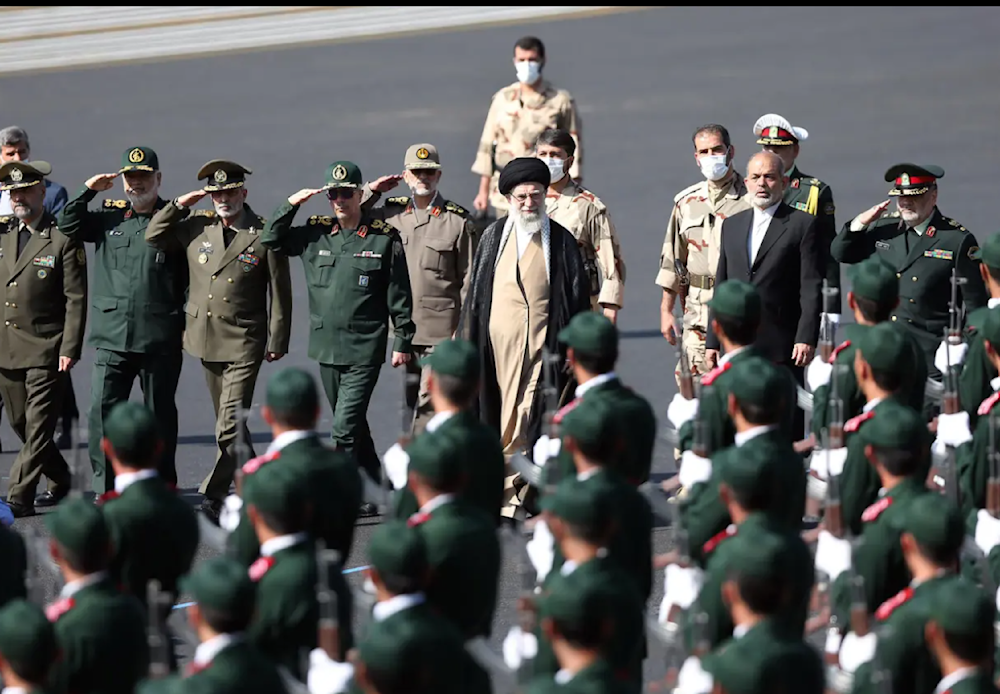Why the US keeps falling short of intimidating Iran: The Economist
According to the analysis, America's failure to ward off Iran arises from fundamental inconsistencies in its Middle East strategy.
-

Iranian leader Sayyed Ali Khamenei reviews a group of armed forces cadets during their graduation ceremony accompanied by the commanders of the armed forces at the police academy in Tehran, Iran, on October 3, 2022. (AP)
Iran has proven "devilishly difficult to deter," particularly because the Iranians' aims are attrition and survival, and they have great capability to accept fatalities, a report by The Economist revealed.
The US forces in Iraq, Syria, and Jordan have been subjected to 169 attacks since last October, according to a new report by Politico.
Iran's allies in the Middle East, essentially the Axis of Resistance in Palestine, Lebanon, Syria, Iraq, and Yemen, have delivered quite a blow to "Israel" and the United States, an independent analysis by Atticus Canham-Clyne in Responsible Statecraft revealed.
US President Joe Biden even admitted that strikes on Yemen have failed to deter Ansar Allah, but vowed to continue them regardless.
The Deputy Foreign Minister for the Sanaa government, Hussein al-Aazzi, confirmed this point, stressing that no entity can resolve its problems with Yemen via violent means, adding that the only way these issues can be resolved is through "wisdom and dialogue."
In regards to Iraq, Canham-Clyne calls the US troops' extended presence akin to "sitting ducks" rather than assets.
According to Biden's critics, the reason is the lack of credibility surrounding the US, since it is unwilling to strike Iran directly.
Lindsey Graham, a Republican senator from South Carolina has stated that Iranian "aggression" will not be deterred unless an attack on Iranian territory takes place.
Left-leaning critics see the real issue at hand and call for a ceasefire in Gaza since the Axis of Resistance has repeatedly stated that the US will suffer the consequences of its complicity in the aggression on the Palestinian people by supporting "Israel" and providing it with weapons to continues its onslaught.
The Economist reported that any attack on Iran's soil would only embolden it further and even allow it to consider developing a nuclear bomb to deter any future attacks.
According to the analysis, America's failure to discourage Iran arises from fundamental inconsistencies in the former's Middle East strategy, specifically its desire to withdraw from the area while retaining troops there, resulting in a military presence large enough to provide a menu of targets but insufficient to limit Iran.
The United States Central Command (CENTCOM) announced in late January that three US soldiers were killed while at least 25 were injured in northeastern Jordan near the Syrian border.
US troops a 'bull's-eye' for Axis of Resistance
Despite this, US officials use missions like protecting a refugee camp as excuses for their ongoing and unwelcome presence in the region, but this, the publication notes, serves only as a "bull's-eye" for the Axis of Resistance.
Iran, side by side with the Resistance factions across the region, aims to drive out the US from the region and inflict as much damage as possible on its allies in the region, mainly "Israel".
Deterrence, The Economist maintains, can only work if that perception changes, stressing that air strikes conveyed a week in advance will not do the trick, nor will the deployment of aircraft carriers and long-range bombers through the region; things the US has done repeatedly in recent years.
According to The Economist, after two decades of failed American interferences, invasions, and wars in the Middle East, neither the Americans nor the Iranians believe that the US is capable of striking Iran directly.
The analysis recalls that even former US president Donald Trump did not have the guts to hit Iran directly.
American allies are also unconvinced of the US' power since Iranian allies have prevailed in Syria and Yemen.
High-ranking military officials from Iran and Saudi Arabia have engaged in talks aimed at exploring potential cooperation in the fields of security and defense. The meeting occurred on the sidelines of the 2024 World Defense Show in Riyadh and involved discussions between Brigadier General Bahman Behmard, deputy head of operations at the General Staff of the Iranian Armed Forces, and Saudi Chief of General Staff General Fayyad bin Hamed al-Ruwaili.
"That is why Saudi Arabia and the United Arab Emirates have both tried to improve their relations with Iran: if America cannot protect its partners, they reckon détente through diplomatic engagement and economic incentives is a safer alternative."

 4 Min Read
4 Min Read








